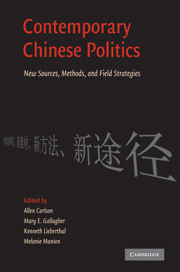Reflections on the Evolution of the China Field in Political Science
Published online by Cambridge University Press: 05 June 2012
Summary
The current volume highlights the range and vibrancy of current studies of China by political scientists in the United States. This is a field that has become relatively mature in terms of the number and types of institutions that produce good China-related research, the array of generations of scholars engaged in that research, the variety of sources available to understand developments in China, and the methodological richness of the field overall. All of this represents a situation very different from and much better than that in the 1960s. But the changes over the past four decades have also introduced problems that require the ongoing attention of the field.
The Evolution of the Field
The world of the 1960s differed fundamentally from that of 2010 in terms of how China is studied. China studies in the earlier period were just reviving in the wake of the devastation wrought by the anti-Communist efforts most memorably associated with Senator Joseph McCarthy, who, in February 1950, asserted that he had a list of 205 Communists being protected in the State Department. The senator – along with others asking “Who lost China?” – decimated the ranks of China specialists in the State Department and questioned the loyalty of scholars such as John K. Fairbank and Owen Lattimore, arguing that they were at least Communist dupes and in some cases active secret members of the Communist Party (Fairbank, 1982). The results were such that Fairbank, generally regarded as the dean of the China field, addressed a conference of China scholars in the early 1970s and advised the younger participants to be sure to always keep a daily diary. He explained that this would prove important when they are investigated by a congressional committee and must explain what they were doing and thinking at any particular point in their past.
- Type
- Chapter
- Information
- Contemporary Chinese PoliticsNew Sources, Methods, and Field Strategies, pp. 266 - 278Publisher: Cambridge University PressPrint publication year: 2010
- 6
- Cited by



